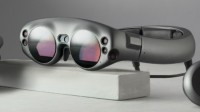Big Tech Companies Make Progress on AR Smart Glasses
November 14, 2019
Amazon, Apple, Facebook, Google, Magic Leap, Microsoft and Snap are among the Big Tech companies working on creating smart glasses that we can wear everywhere — and that may even replace our smartphones. Currently, glasses are too big (and expensive), but in time are expected to achieve a sleeker form factor and come down in price. Smart glasses promise to dramatically shift how we engage with the world, and some advocates believe we will eventually be able to replace every screen we use with a single pair of glasses.
CNBC rounds up the work that these companies are doing to bring viable smart glasses to fruition. Microsoft put its $3,500 HoloLens 2 headset (below) on sale last week, and the Army is using a modified version, dubbed IVAS, that allows them to “overlay images like the positions of fellow soldiers and the enemy over the vision of the soldiers” wearing the headsets.

For commercial use, HoloLens 2 can display computer programs, freeing workers from sitting at a computer. Snap’s Spectacles 3 glasses (below) go on sale this week for $380. The user won’t be able to see any information through the glasses, but “the company is reportedly working toward adding augmented reality into the frames” in its fourth version, code-named Hermosa.

Google Glass “shows information, but not 3D augmented reality, to wearers,” and Google’s Android platform supports AR apps. Google Maps on Android and iPhone offers an AR feature that “overlays information, including walking directions, on top of the real world.”
Google “hasn’t publicly talked about new AR glasses yet,” but appears to be working in that direction. Magic Leap’s headset (below), which launched in August 2018, has a starting price of $2,295. It’s “a relatively bulky headset” with “AR applications [that] let you watch TV, work in computer programs and more, all while still seeing the normal world.”

Apple is slated to release its Oculus Quest-sized AR headset in 2022, with smaller AR glasses launching in 2023. Apple’s iOS platform already hosts thousands of AR apps, and the company’s iPhones and iPads have AR support. Siri, which “works with wearable products like the AirPods and Apple Watch,” could be integrated into smart glasses.
Facebook currently sells VR products, but partnered with Luxottica to develop AR glasses, codenamed Orion, expected to debut between 2023 and 2025. These glasses are “designed to take calls and let users stream video to other people,” but the company is reportedly struggling with getting the form factor small enough to appeal to consumers. Similar to Apple, “Facebook has an existing communications platform that could translate easily” to smart glasses. The company also has Spark AR, an AR developer kit.
Amazon hasn’t specifically talked about AR glasses, but its Echo Frames have a speaker and voice assistant Alexa built into them. Amazon could add AR capabilities by adding screens. The company also has services such as Prime Video and shopping that it could “easily apply to AR glasses.” CNBC concludes that “we may still be years away from smart glasses … but the apps, smart voice assistants and software are already in place.”

No Comments Yet
You can be the first to comment!
Sorry, comments for this entry are closed at this time.